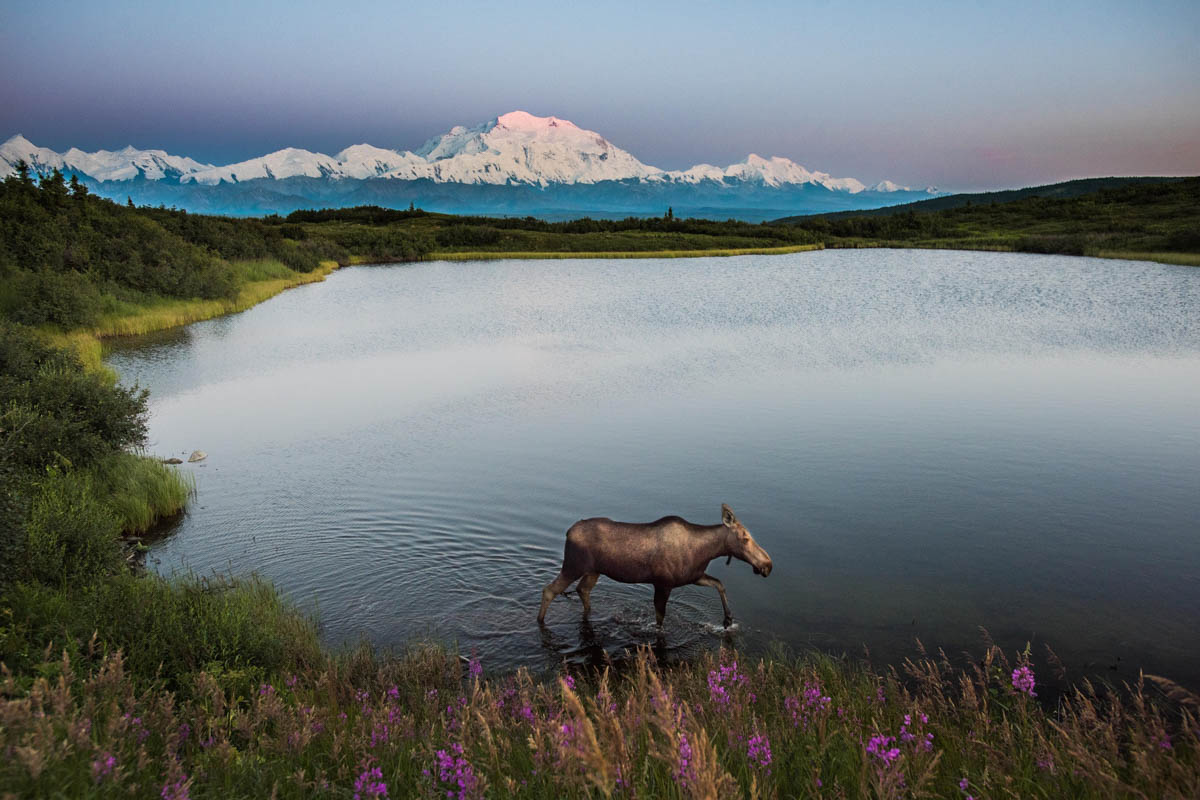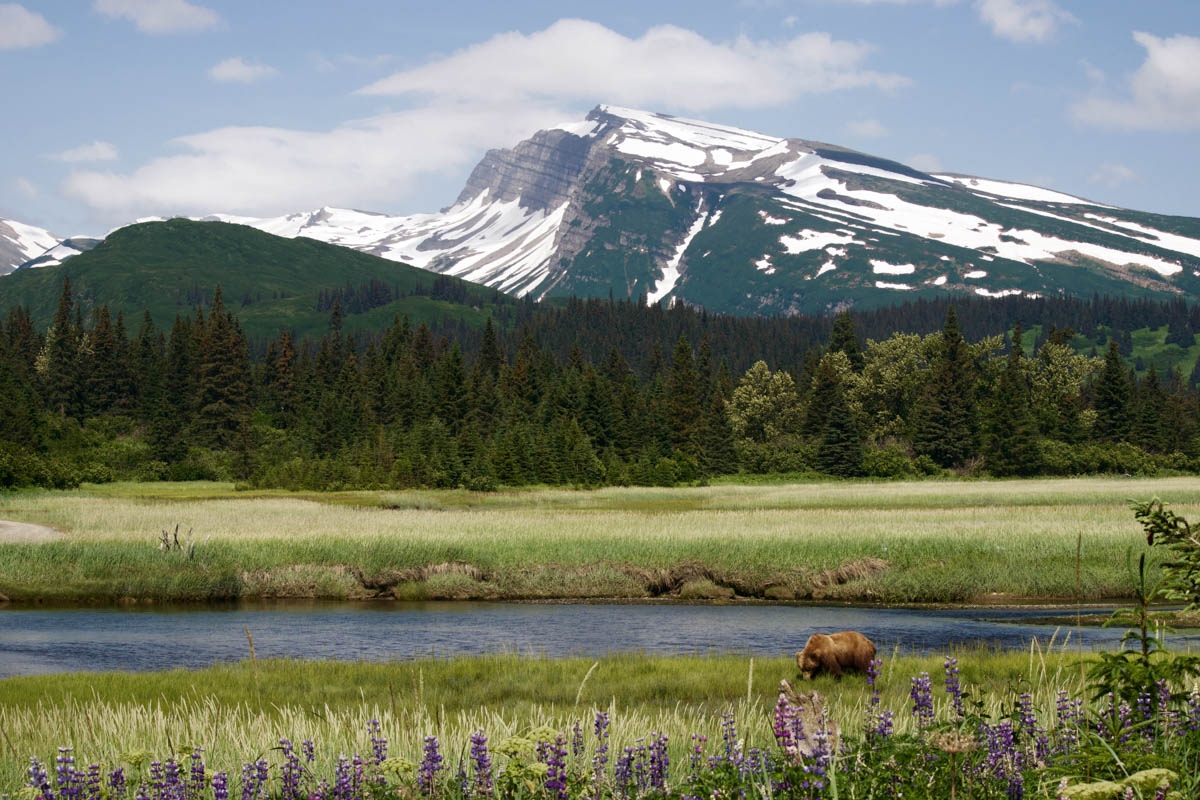Denali National Park & Preserve, Alaska
Denali National Park is your wild welcome mat to the Alaskan wilderness. Sprawling out between Anchorage and Fairbanks, it sweeps over the Alaska Range – the highrise marker of the active fault line that swings from east to west across Alaska. The national park pairs up with Denali Preserve to lay out almost 25,000km2 of subarctic wilderness teeming with wildlife free from fences and human interference.


Summer in Denali is one big knees-up for nature. Expect towering mountains, riots of wildflowers and berries, roaming bears and moose, and impenetrable forests. ![]()

Charles Sheldon, a hunter and conservationist who fell hard for Denali’s vistas, campaigned to create the national park in 1917 to stop Dall sheep from being wiped out. The park has proven to be a bit of an overachiever, going above and beyond its original purpose. With half a million visitors a year, enduring strict conservation rules have kept Denali pristine.
Mount Denali (6,194m) climbs above the park and reserve. It’s the highest mountain in North America and went by Mount McKinley until 2015. But Alaskans managed to reclaim its Athabaskan moniker, which means the ‘great one’ or ‘high one’. The rest of the peaks aren’t exactly Lilliputian, either. The USA’s ten highest peaks in are in Alaska – and three of those peek out of the Alaska Range.
Mount Denali (6,194m) climbs above the park and reserve. It’s the highest mountain in North America and went by Mount McKinley until 2015. But Alaskans managed to reclaim its Athabaskan moniker, which means the ‘great one’ or ‘high one’. The rest of the peaks aren’t exactly Lilliputian, either. The USA’s ten highest peaks in are in Alaska – and three of those peek out of the Alaska Range.

Denali National Park and Preserve is barely grazed by human feet, although increasingly touched by climate change.![]()

A good 6,000m or so below the snowy peaks, Denali National Park and Preserve unrolls tundra, boreal forests of spruce and aspen, wildflower plains, looking glass lakes and glaciers. In fact, you’re more likely to see bear prints than footprints. Both black and brown bears (including Hulked-out grizzlies) rummage the landscape for food. Moose give them a run for their money, size-wise, while lynx, wolverines, caribou and wolves rove under the radar.
Although Denali steals a starring role on many Alaska vacations, it’s easy to escape the crowds – especially when in the hands of a small group tour teamed with an expert guide. Read on to find out the best way to tackle your vacation to Denali National Park and Preserve.
Although Denali steals a starring role on many Alaska vacations, it’s easy to escape the crowds – especially when in the hands of a small group tour teamed with an expert guide. Read on to find out the best way to tackle your vacation to Denali National Park and Preserve.
Things to do in Denali National Park
Think you have to head to Africa to catch up with the Big Five? Well, Denali offers up a Big Five of its own: grizzly bears, wolves, moose, caribou and Dall sheep. But Alaska being Alaska, it doesn’t stop there. You could also see snowshoe hares racing across the plains and black bears stripping berries from the forest branches. Lynx and wolverines are too shy to stalk into your binocular line, but it’s enough to know that they’re happily lurking in the depths of the park. The skies are a-flutter, too. Alaskan birds are mostly migratory, although hardy bald eagles, northern hawk eagles, grey jays and golden eagles stick around all year.
Wilderness guides are your behind-the-scenes pass into Denali National Park and Preserve. Because while most national parks in the USA are netted with tidily signposted trails, Denali takes its footprint-free ethos seriously. It’s one of the few national parks to encourage hikers to head off the map into the backcountry, with rangers considering footpath construction more damaging than individual exploration.
Wilderness guides are your behind-the-scenes pass into Denali National Park and Preserve. Because while most national parks in the USA are netted with tidily signposted trails, Denali takes its footprint-free ethos seriously. It’s one of the few national parks to encourage hikers to head off the map into the backcountry, with rangers considering footpath construction more damaging than individual exploration.
Your guide is your way in to some of the most spectacular scenery in Alaska. They could take you on a tour of the boreal bear forests of aspen. Or through tundra sprinkled with miniscule wildflowers and cottongrass that turns gold in autumn. Savage River and Wonder Lake are two of the easier hikes, offering up waters that mirror snow-striped mountains. Of course, no trails really does mean no trails – even across murky meadows or streams – so prepare to get your toes wet.

16 percent of Denali National Park and Preserve is a jigsaw of glaciers. Kahiltna is the longest, lolling out for 70km.![]()

Hundreds of glaciers drool out from between the mountains of the Alaska Range. You can hop in a helicopter and land on the most stable glaciers. Listen out for the water running far below; bubbles escaping from the deep sound like a buzzing livewire.
Fancy waking up to the rustle of moose and views of cold-clear mountains? Camp it. Each site only welcomes three to eight happy campers. On a small group vacation your guide will pick out the best one for you and book you in. They’ll also give you a crash course in Denali-style camping – including bear safety know-how.
Winter throws a thick blanket of snow over Denali, making it almost completely inaccessible. Although the access road is shut, a great tour operator will be able to show you how to explore Denali like an Alaskan – dog sledding, show shoeing and cross country skiing and all.
Fancy waking up to the rustle of moose and views of cold-clear mountains? Camp it. Each site only welcomes three to eight happy campers. On a small group vacation your guide will pick out the best one for you and book you in. They’ll also give you a crash course in Denali-style camping – including bear safety know-how.
Winter throws a thick blanket of snow over Denali, making it almost completely inaccessible. Although the access road is shut, a great tour operator will be able to show you how to explore Denali like an Alaskan – dog sledding, show shoeing and cross country skiing and all.
How to get around Denali
There’s only one road in and out of Denali National Park and Preserve. Reason one: it’s remote, about a two-hour drive south of Fairbanks. Reason two: to stop private and tour vehicles running riot. The gravel ‘park road’ moves like a river beside the Alaska Range, winding around forest, plains and mountainsides for almost 150km.
Private vehicles aren’t allowed more than a few kilometres down the road to Savage River. After that, it’s handed over to the visitor center buses that follow different routes. You could go deep into the tundra on the eight-hour tour, follow in the footsteps of mining pioneer and wilderness lover Fannie Quigley on the 12-hour Kantishna tour, or loop around the park on a natural history tour that teaches you how Alaska Natives and their ancestors have used the land for nearly 10,000 years.
Of course, bears and moose can hear you coming a mile off in the buses, so although the landscapes are permanently set on stun mode you’re unlikely to see much in the way of wildlife. That’s what small group vacations are for – your guide is the permission slip you need to hop off the bus and delve into the Denali that’s beyond the park road.
Private vehicles aren’t allowed more than a few kilometres down the road to Savage River. After that, it’s handed over to the visitor center buses that follow different routes. You could go deep into the tundra on the eight-hour tour, follow in the footsteps of mining pioneer and wilderness lover Fannie Quigley on the 12-hour Kantishna tour, or loop around the park on a natural history tour that teaches you how Alaska Natives and their ancestors have used the land for nearly 10,000 years.
Of course, bears and moose can hear you coming a mile off in the buses, so although the landscapes are permanently set on stun mode you’re unlikely to see much in the way of wildlife. That’s what small group vacations are for – your guide is the permission slip you need to hop off the bus and delve into the Denali that’s beyond the park road.
Alaska adventure vacation, salmon run
Active small group adventures in a retrofitted school bus
From
US $4980
20 days
ex flights
Denali National Park vacation in Alaska
Experience untouched wilderness off the beaten path
From
US $3090
12 days
ex flights
Alaska classic tour, glaciers and grizzly bears
Experience the best of Alaska in the Summer!
From
US $8495
9 days
ex flights
Calgary to Anchorage adventure vacation, Goldrush Trail
Wildlife and historic gold towns in a retrofitted school bus
From
US $3790
20 days
ex flights
Kenai Peninsula adventure vacation in Alaska
Orcas, Humpbacks and Glaciers: Experience Alaska's coastline
From
US $2990
9 days
ex flights
Travel Team
If you'd like to chat about Alaska, USA or need help finding a vacation to suit you we're very happy to help.
1-866-821-6866
Call toll free
Calling from outside the USA
When to go to Denali National Park
Winters in this subarctic zone are as bitter as the season is long, so most people visit Denali in the summer. Things are comparatively toasty between late May and early September. Usually cool days can peak at 24°C in the long days of midsummer, melting the last of the snow.

It’s all a bit like Sleeping Beauty’s kingdom waking up after the curse is lifted. The 430 species of flowering plants start to bloom, berries bejewel the trees and shrubs, and the forests shake off the snow. It’s also when the glaciers creep back from whence they came, opening up access to hikers and mountaineers. It’s still Alaska, mind you, so expect rain and snow all year round.

The glaciers shrink another couple of metres every year, giving a live action illustration of how climate change affects Alaska.![]()

Winters ice up Denali from late September to April, shutting down the access road. Unless you’re well prepared, it’s a miserable time to be in town. Temperatures can stay below -18°C for long stretches and can sink to -40°C at night. Saying that, if you’ve come for a winter vacation, you’ll be well prepared. Snow shoes and ski thermals open up the landscape to an empty vista of hiking and dog sledding.

























